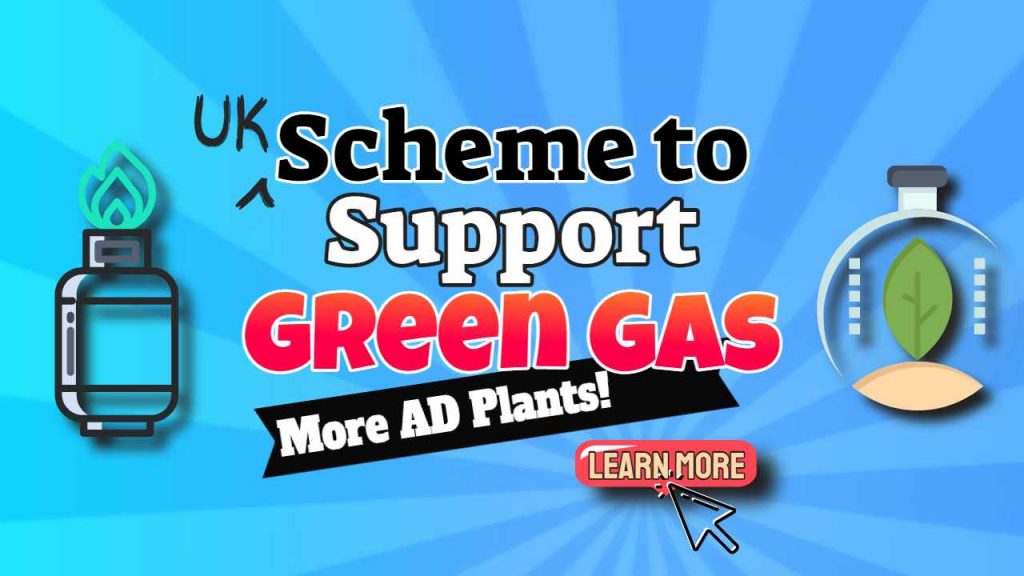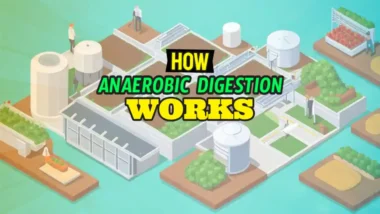Update: The Green Gas Support Scheme application window has been extended to 31 March 2028, in an announcement made this week (January 2024).
In a strategic move to bolster the UK's commitment to environmental sustainability and green energy, the Department for Energy Strategy and Net Zero (DESNZ) has officially extended the application deadline for the Green Gas Support Scheme. The crucial date shift from March 31st, 2026, to March 31st, 2028, was publicly announced on October 21st and was today confirmed, granting a substantial two-year additional window for stakeholders within the bioenergy sector to apply.
This will help anaerobic digestion (AD) plant operators put in their applications for payments under this incentive.
Today's announcement in more detail
The Government Response to the GGSS Mid-Scheme Review Consultation has been published by the Department for Energy Security and Net Zero today.
No surprises – just two changes to the Scheme as set out below:
- Extending the GGSS to 31 March 2028 to provide sufficient time for prospective applicants to commission on the scheme before it closes. As announced late last year, this change will take effect once the changes pass through Parliament in the coming weeks/months. Anyone who has already applied for the scheme or applies before the changes are passed will not be eligible for the extension and would still need to commission by 30 November 2025.
- Introducing an exemption for heat supplied by eligible heat pumps to stop it being deducted as part of eligible biomethane calculations in the same way that fossil fuel heat sources are. Scheme participants using an eligible heat pump may receive increased eligible biomethane tariff payments as a result.
– No change to the waste feedstock requirement
– CHP conversions or expansions remain ineligible
– Digestate management requirements remain
– Rules around Tariff Guarantee and Commissioning timescales and deadlines remain unchanged.
The Response mentions the future policy framework for AD and Biomethane in many parts, and a call for evidence in future support will be issued shortly – lots of stakeholder engagement is expected in the coming months to support this
[boomdevs_toc]
Implications for Anaerobic Digestion Operators
This pivotal decision by DESNZ directly relates to the core criteria of the Green Gas Support Scheme, which mandates that for AD plants to be considered for payments under this scheme, at least 50% of biomethane output from new AD sites must originate from organic wastes.
Aligning with this objective, the extension is particularly timely, considering Defra’s recent mandate that separate food waste collections must be operational throughout England by 2026.
This new rule in the UK says that all of England needs to start collecting separate food waste once a week. This is expected to greatly increase the amount of organic waste that AD operators can use as feedstock, which is an important resource for long-term biomethane production.
Industry Feedback and Projections
Chris Huhne, chair of the Anaerobic Digestion and Bioresources Association (ADBA), expressed enthusiasm regarding DESNZ's announcement.
“The extension of the Green Gas Support Scheme application deadline is a positive development for the industry, coinciding directly with the recommendations ADBA presented to DESNZ during the mid-term scheme review in March,”
Huhne remarked.
He emphasized the necessity of this extension, having specifically advocated for an additional two years.
This time is very important for AD operators to:
- get the contracts and infrastructure they need
- make sure they follow the Green Gas Support Scheme's 50% eligibility ratio, and
- create an environment that is good for sector growth.

Key Outcomes Anticipated from the Extension:
- We expect a rise in the establishment of new biomethane plants to mirror the sector surge witnessed during the introduction of earlier incentives like the Renewable Heat Incentive, Feed-In Tariffs, and Renewable Obligation schemes
- Enhanced societal benefits, including mitigating climate change impacts and fortifying energy and food security within the UK.
Anticipation for the Upcoming GGSS Mid-Scheme Review
While the industry celebrates this development, anticipation builds for the forthcoming publication of the Green Gas Support Scheme Mid-Scheme Review, expected before the close of the year.
Stakeholders, particularly ADBA, are optimistic for additional affirmative news concerning other proposals detailed in the consultation document.
Conclusion
The DESNZ’s decision to extend the Green Gas Support Scheme application deadline underscores the government's commitment to nurturing the UK’s green gas sector. This forward-thinking approach not only promises significant industry growth but also represents a crucial step towards the nation’s broader environmental and sustainable energy goals.
Published on 18 December 2020:
The Green Gas Support Scheme (GGSS) Announced to be Financed via a Levy on Licensed Gas Suppliers
The UK Department for Business, Energy, and Industrial Strategy (BEIS) has announced the start of the long-awaited Green Gas Support Scheme (GGSS), which OFGEM will oversee.
Funded by a supplementary levy on licensed gas suppliers, it will come into force in April 2022 (although those putting biomethane into the grid will be able to claim from autumn 2021) and last for four years before a further scheme is put in place.
A key eligibility criterion will be the sustainability of the feedstock. Like RHI, biomethane producers will be paid on a tier system, but the scheme will work with other existing support mechanisms, such as ROTC, which supports biomethane transport.
BEIS has not yet said what the exact levels of support will be but has indicated that the full details of the scheme will be communicated in the spring.
Now the details, as with any government support, will be complex, but as anyone attached to the industry knows, without support for AD build projects, they will become fewer in number.
One of the difficulties with AD projects can be the timescales involved, especially getting planning and then having everything else ready to go.
However, with projects coming down the tracks, the industry now knows what’s coming, and let’s be clear: this support is crucial for the industry to flourish and to allow projects to keep going.
The Green Gas Support Scheme (GGSS) is to replace the UK incentive known as the RHI (Renewable Heat Incentive), – As explained by DMT here.Like in other countries, the UK has an incentive to promote the production of renewable green gas. Currently, we know this incentive as the RHI (Renewable Heat Incentive).
This is soon to take on a different name under new reforms coming in March 2021.
The Green Gas Support Scheme (GGSS) is an incentive to increase the proportion of green gas in the National Gas Grid, like the RHI. It supports the production of biomethane and biomethane injection in the grid.
The Green Gas Support Scheme Should Give UK Projects the Clarity to Move Forward
What’s more, it will not only give UK projects the clarity to move forward but also allow the AD industry (and Marches!) to export our world-beating services around the globe. So, we at Marches Biogas would like to thank ADBA and the REA for all the work they do and to allow for a little more optimism to spread into 2021! via www.marchesbiogas.com
Biogas upgrading: how to get support!
The U.K. Renewable Energy Association has spoken out in support of the initiative.
“The REA welcomes today’s announcement about this key consultation, as the Green Gas Levy will be the funding mechanism that enables more biomethane plants to be built under the future Green Gas Support Scheme, and more biomethane to be injected into the gas grid, ”
Frank Gordon, head of policy at the REA,
“Decarbonizing the U.K.’s extensive grid with biomethane – from AD and thermal gasification – is vital to achieving net zero, as well as to delivering wider benefits to farming, industry and the waste sectors.”
An Energy Networks Association article follows:
Green gases will allow us to rise to the biggest challenge of decarbonisation
Green gases such as hydrogen and biomethane offer huge opportunities for the UK, argues Chris Train, the Energy Networks Association’s Green Gas Champion
It's fair to say that since we last marked Green Gas Day, the whole landscape around green gases such as hydrogen and biomethane has changed in a way that many might not have expected.
Over the course of 2020, hydrogen, in particular, has been on perhaps the most radical of journeys, rapidly securing its front-row position in decarbonisation plans and policies across the globe.
In the UK, this is not just industry hype or the product of the Prime Minister's apparent enthusiasm.
The fundamentals are in place to justify that change. With an extensive, world-leading gas network, huge amounts of offshore wind resources, and many liquid energy markets, there are few other places as well-positioned as the UK to lead that race.
And where there is a need for hydrogen, there is also a need for biomethane too, working in partnership to reach all corners of the country.
“Future support for low carbon heat from the GOV.UK”
But as we look forward to COP26 in Glasgow next year, we must not lose sight of why green gases like hydrogen and biomethane have such a valuable role to play.
We all know that the next major frontier in tackling the climate emergency is to reduce emissions from our homes. The average annual carbon emissions from a UK household currently weigh almost three tonnes.
But by 2050, if we're to reach our net-zero emissions target, they need to drop by 95 % to just 135kg.
What's more, decarbonising household emissions is arguably the most complex, politically challenging, disruptive, and, if not done correctly, expensive part of the decarbonisation puzzle that we have to solve.
To solve that puzzle, we as an industry have to remember that for all the technical debates and the details we often focus on, the technologies we use to heat our homes, provide hot water, and cook our food are all about fulfilling some of our most basic human requirements.
Whatever your view on what the best means of doing that is, we as an industry have to be sensitive to that reality.
Hydrogen and Biomethane: the Green Gas Support Scheme
So if there is one area in which green gases like hydrogen and biomethane have such huge potential, it is to give us all the ability to work with people's needs to reduce their carbon emissions by using them to replace natural gas and develop the world's first zero-carbon gas grid here in the UK.
Our proposition for creating that grid, delivered through the Energy Networks Association's Gas Goes Green program, is simple.
- First, it will reduce people's carbon emissions from heating, hot water & cooking, as well as their transportation, in the least disruptive and cheapest way possible.
In the first instance, we can do that by blending up to 20% of hydrogen and increasing amounts of biomethane into the gas grid, without having to change people's boilers or cookers.
This simple move could help the UK reduce emissions by six million tonnes of carbon dioxide emissions every year, the equivalent of taking 2.5 million cars off the road. To go beyond blending that 20 percent of hydrogen, we should look to mandate hydrogen-ready boilers for new installations.
2. Second, through that process, the green gases delivered by the grid will support the delivery of greener home appliances that are familiar to people in terms of how and when they use them.
With minimal disruption in our homes, that grid will build on the strengths of our current energy system and ensure 23 million homes can access the energy they need in the way they'd like and when they need it the most, in a clean, reliable, and safe way.
Third, a zero-carbon gas grid will transform the role that our gas networks have to play in our energy system. It will create new demand for clean technologies and green gas while stimulating new green industries, supply chains, and jobs for people in communities across the country.
“The Green Gas Support Scheme – a step towards low carbon heating and a shot in the arm for anaerobic digestion”
A world-leading hydrogen economy could create 225,000 jobs by 2050 in the UK, but the investment is already being delivered now by replacing old iron mains with new hydrogen-ready plastic pipes. By 2032, this work will have delivered £28bn in jobs and supply chains in communities across the country.
With our extensive gas grid infrastructure and the opportunities that green gases such as hydrogen and biomethane have to offer, it is their potential to turn the existing challenges around decarbonisation that we face into new opportunities for Britain to lead the world that is perhaps the most exciting.
As we look towards COP26 next year, let's make sure we seize that opportunity. The Green Gas Support Scheme is just one initiative to bring forward.
Chris Train is the Energy Networks Association's Green Gas Champion and a former CEO of Cadent and National Grid Gas Distribution Ltd.
Read more: businessgreen.com
What was the proposed 2021 tariff per kWh?
The GGSS will replace the RHI when it ends in March 2021. The rate of the tariff is differentiated to reflect the production costs of biomethane on different scales. Current data shows that over 90% of biomethane is produced under 1, for plants that have been commissioned since tiering was introduced. Industry feedback is that the current tiering structure reduces the likelihood of economies of scale and deployment of large-scale biomethane AD plants.
The proposed tariff amount under the scheme is:
Green gas Support Scheme Tier 1, 4.9-5.5 p/kWh, Tier 2, 3.25-3.75 p/kWh, Tier 3 1.5-2.75 p/kWh via DMT-ET
Why the Government’s proposed Green Gas Support Scheme underestimates biomethanes’ potential
We were hoping the new scheme would improve upon the current system, the Renewable Heat Incentive (RHI). Tariff degressions and the RHI’s looming termination, scheduled for March 2021, has created much uncertainty in the AD sector.
Biomethane has so much more to offer than this. Industry and independent bodies have conducted reports predicting the potential scale of UK biogas production from AD for heating and transport. Both trade associations that represent the AD industry calculate a contribution of over 50 TWh by 2032 (REA, 2019; ADBA, 2020), while research prepared for the Energy Network Association suggests over 50 TWh by 2050. The Committee on Climate Change, the government-appointed advisory body on emissions targets, has set a goal of 20 Terawatt-hours per year by 2030 – on heating alone.
The proposed annual target from BEIS under the GGSS would increase the biomethane injected into the grid by 2.4 Terawatt-hours per year by 2030/2031. The REA predicts that the RHI (which includes new applications) and the GGSS contribution will bring in about 9TWh of biomethane from AD each year by 2026.
While the figures from ADBA, the REA, and ENA include transport as well as heat, the UK Government is still far off independent predictions, including the CCC.
Our UK anaerobic digestion industry needs the right government backing to fulfill its potential. We had hoped the GGSS would provide just that. However, this format seriously downplays biomethane’s potential contribution to attaining net zero.
Investing Fully in Biogas’ Potential
Of course, we welcome all investment in the AD sector, and we appreciate the intent of this scheme.
However, this is a significant moment in the climate crisis. We must make the right decisions, and we must make them quickly.
To hit net zero on time, we have got to be as efficient and streamlined as possible. This scheme should be based on AD’s true potential. Too much is at stake for this opportunity to be wasted. via Future Biogas
Related Topics: renewable heat incentive, RHI business energy industrial strategy, gas support scheme GGSS proposed green gas support
Featured Image Attribution: The biogas plant shown is courtesy of Spielvogel, CC BY-SA 4.0, via Wikimedia Commons.
FAQs: Green Gas Support Scheme (GGSS)
General Information
- What is the Green Gas Support Scheme (GGSS)?
The Green Gas Support Scheme is a government initiative in the UK designed to encourage the production of biomethane from anaerobic digestion for injection into the gas grid. - Who oversees the GGSS?
The GGSS is overseen by the Department for Business, Energy & Industrial Strategy (BEIS) and administered by Ofgem. - What is the primary purpose of the GGSS?
The primary purpose of the GGSS is to support the UK's commitment to achieving net-zero carbon emissions by promoting the use of greener, sustainable gas sources.
Application and Eligibility
- What are the eligibility criteria for the GGSS?
Eligibility for the GGSS is based on meeting specific requirements, including the sustainability of feedstock, biomethane production capacity, and adherence to environmental regulations. - How can I apply for the GGSS?
Applications can be made through the Ofgem website, where applicants must provide detailed information about their biomethane production project. - What is the deadline for GGSS applications?
The deadline for applications is subject to periodic updates by the government. Please refer to the latest announcements on the Ofgem website for current deadlines.
Funding and Support
- How is the GGSS funded?
The GGSS is funded by the UK government via a duty paid by large energy suppliers, with financial support allocated based on the volume of biomethane produced and injected into the gas grid. - What are the financial incentives under the GGSS?
Financial incentives include tariff payments for biomethane production, which are tiered based on production capacity and project specifics. - Are there different tiers of support in the GGSS?
Yes, the GGSS has different tiers of financial support, which are designed to incentivize both small and large-scale biomethane production projects.
Impact and Projections
- What are the anticipated outcomes of the GGSS extension?
The GGSS extension will, it is hoped, significantly boost the production of biomethane, contributing to the UK's renewable energy goals and reducing carbon emissions. - How does the GGSS contribute to environmental sustainability?
The scheme promotes the use of sustainable feedstocks and renewable energy, thereby reducing reliance on fossil fuels and lowering greenhouse gas emissions. - What are the projected benefits for the AD industry?
The GGSS will, if developed further by the government, be anticipated to stimulate growth in the anaerobic digestion industry, leading to job creation, technological advancements, and increased renewable energy production.
Additional Green Gas Support Scheme Information
| Topic | Description |
|---|---|
| Feedstock Requirements | Projects must use sustainable feedstock for biomethane production, adhering to environmental guidelines. |
| Heat Pumps Exemption | Heat supplied by eligible heat pumps is exempt from calculations of biomethane production for GGSS support. |
| Industry Feedback | Industry stakeholders have generally responded positively to the GGSS, citing its potential for growth and sustainability in the biomethane sector. |
| Future Policy Framework | The GGSS is part of a broader policy framework aimed at supporting renewable energy and achieving the UK's climate goals. |
[Updated 22 October 2023.]






The extension of the Green Gas Support Scheme is a positive step, but we need a more comprehensive and sustainable strategy for biomethane plants. We should set clear targets for environmental impact and societal benefits. The upcoming Mid-Scheme Review is an opportunity to fine-tune the scheme for long-term success.